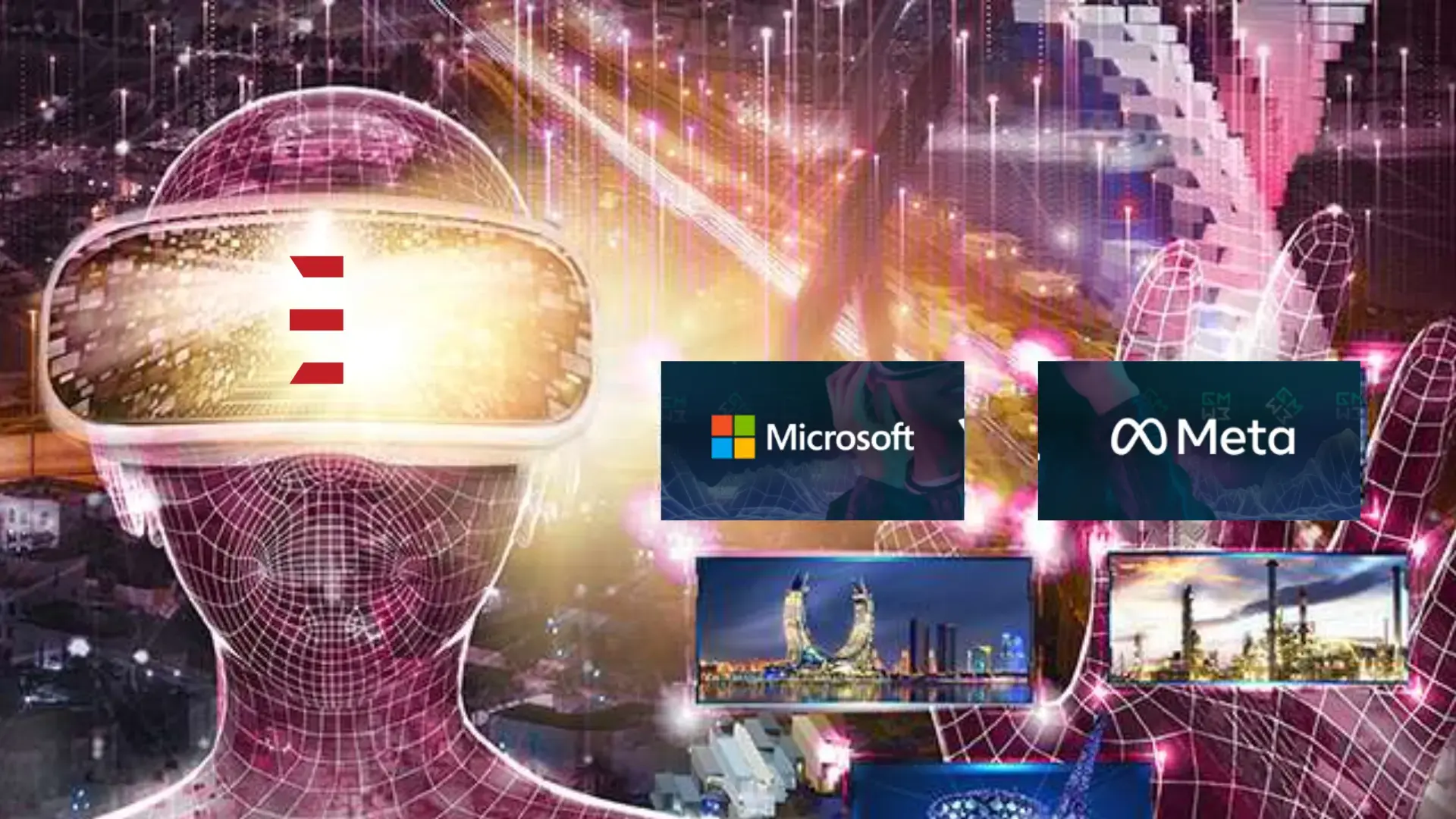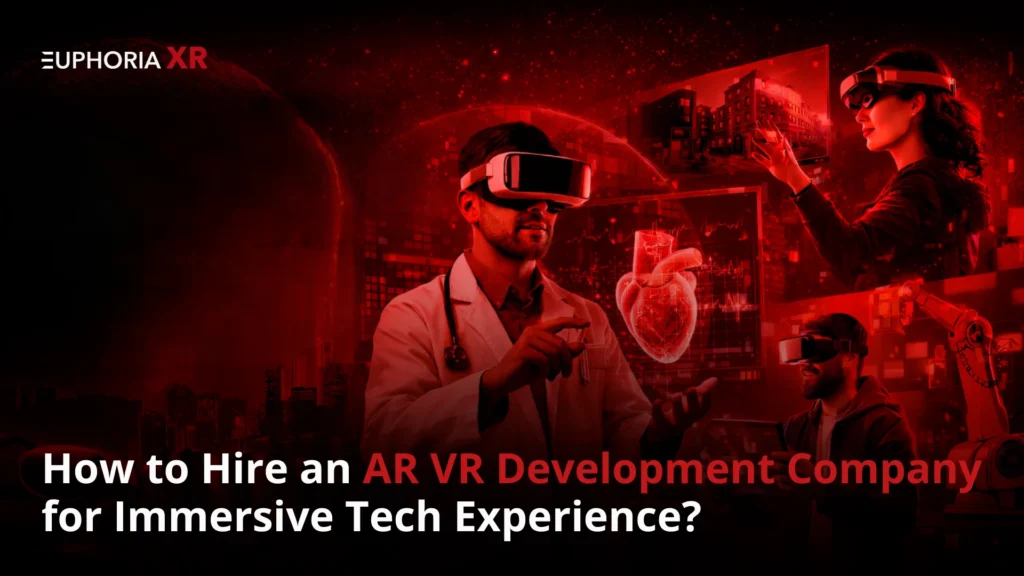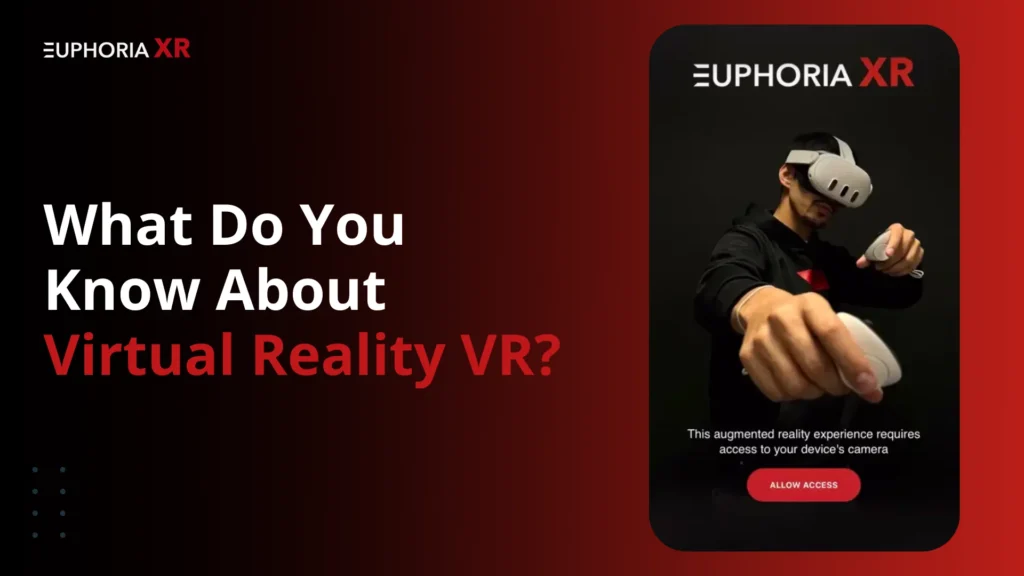Today’s main focus of the tech industry is creating digital environments that mimic real-world experiences. This effort has given rise to the concept of the “metaverse,” with virtual reality (VR) and augmented reality (AR) at its core. Leading tech companies like Meta and Microsoft are making significant strides in this area. This effort has led to the development of the “metaverse” with virtual reality (VR) and augmented reality (AR) playing central roles.
While the transition to this new digital interaction paradigm has been gradual for users and investors, there is growing interest and enthusiasm. Predictions suggest that by 2026, 25% of people will spend at least one hour daily in the metaverse, prompting 30% of organisations worldwide to adapt their products and services for this virtual space. This transformation has the power to change the technological world.
The metaverse offers a range of possibilities, including work, live entertainment, art shows, investment opportunities, education, socializing, and gaming. For businesses seeking to capitalize on these opportunities, partnering with a custom metaverse development company could provide customized solutions to enhance their metaverse presence.
What is the Metaverse?
The metaverse is a virtual world where users can interact with a computer-generated environment and other users. This immersive space combines elements of augmented reality (AR), virtual reality (VR), and artificial intelligence (AI) to create a seamless blend of the physical and digital worlds.
When Facebook rebranded as Meta in 2021, Mark Zuckerberg described the metaverse as the “internet embodied,” reflecting the company’s shift in focus. This idea resembles Philip Rosedale’s vision of the metaverse as a 3D internet where users engage through avatars.
The metaverse is a virtual environment powered by augmented reality (AR) and virtual reality (VR) technologies, providing users with an immersive experience. Web 3.0 technologies, such as blockchain and cryptocurrency, artificial intelligence (AI), and machine learning (ML), can be integrated to enhance decentralization and privacy within the metaverse.
While rudimentary forms of the metaverse have existed for over a decade, platforms like Roblox—operational since 2006—primarily focused on gaming and social networking. Recently, the concept has evolved to include applications in the workplace, giving rise to what is now known as the enterprise metaverse.
The shift has been significant; by 2021, more than half of the metaverse traffic was work-related. Companies like Microsoft and Meta have developed platforms supporting collaborative tasks and projects, while others focus on building metaverse environments to enhance customer engagement.
Market Value of Metaverse:
The Metaverse market was valued at approximately USD 63.45 billion in 2022 and is projected to grow from USD 86.31 billion in 2023 to USD 803.29 billion by 2031, reflecting a compound annual growth rate (CAGR) of 39.68% from 2024 to 2031.
In 2023, global social media users reached 4.95 billion, a 7.07% increase from 4.62 billion in 2022. Companies such as Meta (formerly Facebook), Decentraland, and VR Chat are actively expanding in the Metaverse space. These platforms are gaining traction due to their potential for virtual connections, content creation, sharing, and hosting events replicating physical-world interactions.
The global Metaverse market was USD 92.46 billion in 2023 and is anticipated to exceed USD 2,369.70 billion by 2033, with a CAGR of 38.31% projected from 2024 to 2033.
How Meta is Shaping the Metaverse
Meta (formerly known as Facebook) is a major force in developing the metaverse. Since rebranding in 2021, Meta has prioritized building a comprehensive virtual world. The company invests heavily in VR and AR technologies to create immersive spaces where users can connect, explore, and engage.
Meta‘s vision for the metaverse transcends entertainment and gaming. It aims to establish a platform for social interaction, work, education, and commerce in a 3D environment. Horizon Worlds, Meta’s flagship virtual space, allows users to create and explore virtual worlds, attend events, and interact more dynamically with others. This initiative represents the beginning of Meta’s broader mission to make the metaverse a central hub for interaction.
Meta‘s influence on the metaverse is substantial. It sets trends and standards that shape the direction of its development. By leveraging its extensive resources, Meta is shaping the metaverse’s evolution, encouraging other companies and developers to follow its lead and focus on social connectivity.
How Microsoft is Shaping the Metaverse
Microsoft is also a key player in the metaverse. The company focuses on enhancing enterprise productivity and collaboration and envisions the metaverse as a means of enhancing business operations through custom metaverse development.
Microsoft is integrating the metaverse with its existing products, such as Microsoft Teams and Azure. The Microsoft Mesh platform exemplifies this integration, allowing users to hold virtual meetings, share content, and interact with 3D objects in a virtual workspace.
By incorporating metaverse technologies into its tools, Microsoft facilitates the adoption of these innovations in the business world, creating new opportunities for collaboration and efficiency. This approach will likely accelerate the metaverse’s use in the business world.
Are you looking for Custom Metaverse Development Services?
We focus on crafting virtual worlds that match your unique vision. Our team handles everything from initial concept to final execution, designing and developing a metaverse platform that engages and inspires.
Marketing in the Metaverse
Much like previous versions of the Internet, the metaverse is becoming a new marketing platform. In the last year alone, major global brands like Nike, Disney, HSBC, and JP Morgan have begun to explore metaverse strategies, recognizing the potential for this new platform to revolutionize customer engagement. According to Citi, the business potential of the metaverse could contribute an estimated $13 trillion to the global economy by 2030.
The metaverse is a great opportunity for marketers to connect with customers more interactively and engagingly. Unlike traditional channels like social media or search engine marketing, the metaverse allows for immersive and experiential interactions that can deeply resonate with audiences. This shift could be as transformative as the move from passive TV and radio advertising to the data-driven, personalized marketing of the internet era.
Metaverse platforms enable brands to understand their customers better through detailed insights into online behavior. This information allows for more precise segmentation and the creation of tailored marketing experiences. As businesses continue to explore metaverse trends, they can offer products and services that align closely with their audiences’ specific needs and preferences.
The Industrial Metaverse
Much like previous versions of the Internet, the metaverse is becoming a new marketing platform. In the last year alone, major global brands like Nike, Disney, HSBC, and JP Morgan have begun to explore metaverse strategies, recognizing the potential for this new platform to revolutionize customer engagement. According to Citi, the business potential of the metaverse could contribute an estimated $13 trillion to the global economy by 2030.
The metaverse is a great opportunity for marketers to connect with customers more interactively and engagingly. Unlike traditional channels like social media or search engine marketing, the metaverse allows for immersive and experiential interactions that can deeply resonate with audiences. This shift could be as transformative as the move from passive TV and radio advertising to the data-driven, personalized marketing of the internet era.
Metaverse platforms enable brands to understand their customers better through detailed insights into online behavior. This information allows for more precise segmentation and the creation of tailored marketing experiences. As businesses continue to explore metaverse trends, they can offer products and services that align closely with their audiences’ specific needs and preferences.
Contact us today for a consultation with our AR/VR expert and learn how we can turn your metaverse ideas into reality.
Top Metaverse Platforms to Watch Out
Augmented Reality (AR)
Overlays digital information in the real world, allowing users to interact with their surroundings in new ways. For example, AR can provide navigation aids, contextual details about objects, or interactive elements within physical spaces. This blending of digital and real worlds enhances user engagement and interaction.
Virtual Reality (VR)
Immerses users in a completely virtual environment, creating a simulated space that users can explore and interact with as though they were physically there. VR is crucial for providing fully immersive experiences in the metaverse, from virtual events and gaming to collaborative workspaces and social interactions.
Web 3.0 (Web3)
Web3 represents the next generation of the Internet, focusing on decentralization, privacy, security, and machine learning. Web3 technologies are integral to the metaverse, giving users more control over their data and interactions. Features like cryptocurrencies and blockchain technology enable secure and anonymous transactions, supporting a decentralized and transparent digital environment.
Artificial Intelligence (AI)
AI is increasingly important in developing and managing the metaverse. AI enhances automation, decision-making, and strategic planning, making virtual environments more responsive and adaptable. It also helps personalize user experiences and optimize features within the metaverse.
3D Reconstruction
Computer graphics involves creating detailed digital models of physical objects or spaces. This technology is vital for producing realistic virtual environments in the metaverse. Using 3D and high-definition imagery, developers can craft accurate digital replicas of real-world locations, adding depth and realism to virtual experiences.
Internet of Things (IoT)
IoT connects various devices and sensors to collect and share data. It bridges the physical and virtual worlds in the metaverse by providing real-time data and enabling dynamic interactions. IoT sensors can gather information from the real world and integrate it into the metaverse, enhancing data management and creating realistic simulations.
Together, AR, VR, Web 3.0, AI, 3D reconstruction, and IoT technologies are shaping the future of the metaverse. These advancements create more interactive, interconnected digital experiences, opening up exciting possibilities for users and developers.
The Bottom Line!
As the metaverse continues to develop, both in marketing and industrial applications, it is clear that this virtual space will play a significant role in the future of business. Companies that adapt to and innovate within the metaverse will be well-positioned to capitalize on its opportunities through enhanced customer engagement or more efficient industrial processes.
Frequently Asked Questions FAQs:
How is Meta influencing the future of the Metaverse?
Meta is shaping the metaverse by heavily investing in virtual reality (VR) and augmented reality (AR). Through platforms like Horizon Worlds, Meta is creating immersive social spaces and leading the charge in making the metaverse a reality.
What role do Meta and Microsoft play in Metaverse development?
Meta focuses on building social and interactive experiences in the metaverse. Microsoft is developing tools for virtual workspaces and business collaboration, making the metaverse helpful for personal and professional purposes.
Who is the leading company in the metaverse?
Meta is one of the leading companies in developing the metaverse, thanks to its significant efforts in VR and AR technologies.
What is Microsoft doing in the metaverse?
Microsoft focuses on how the metaverse can be used in business, creating virtual workspaces and tools like Microsoft Mesh that allow people to collaborate in virtual environments.






![Top 50 (CTA) Call to Action Synonyms That Drive ROI & Conversions [+ Examples] - Euphoria XR](https://euphoriaxr.com/wp-content/uploads/2026/02/Top-50-CTA-Call-to-Action-Synonyms-That-Drive-ROI-Conversions-Examples-Euphoria-XR-1024x576.webp)









